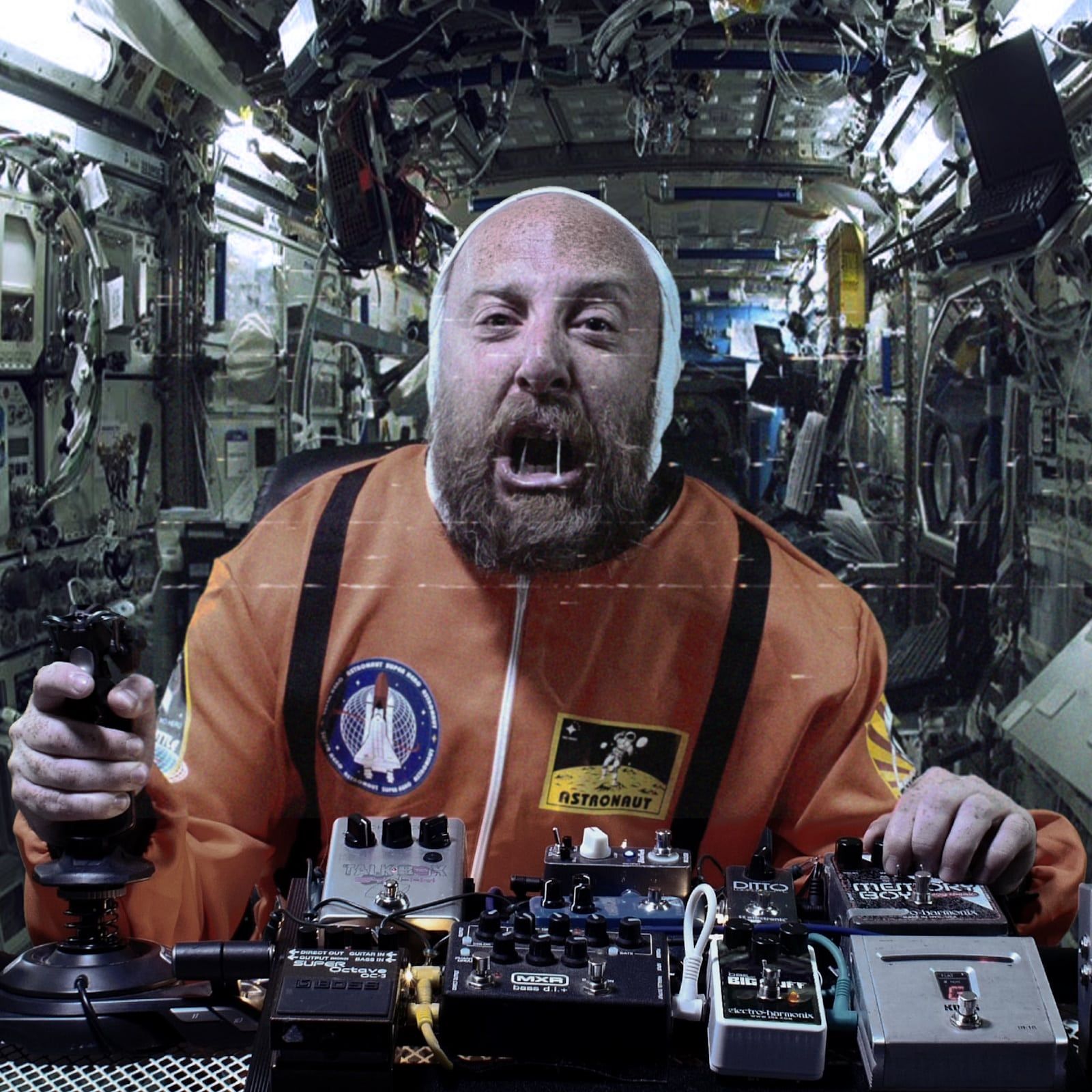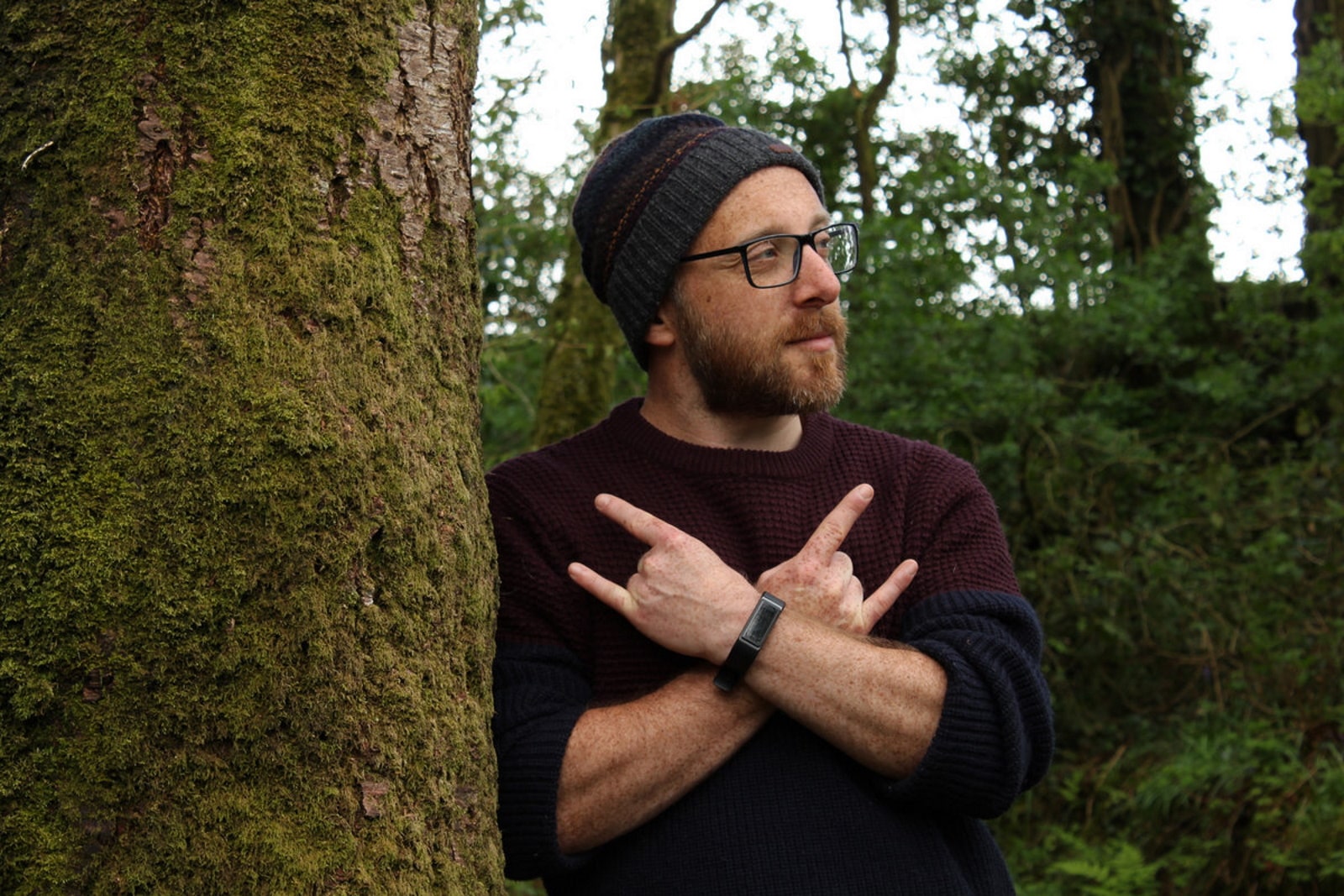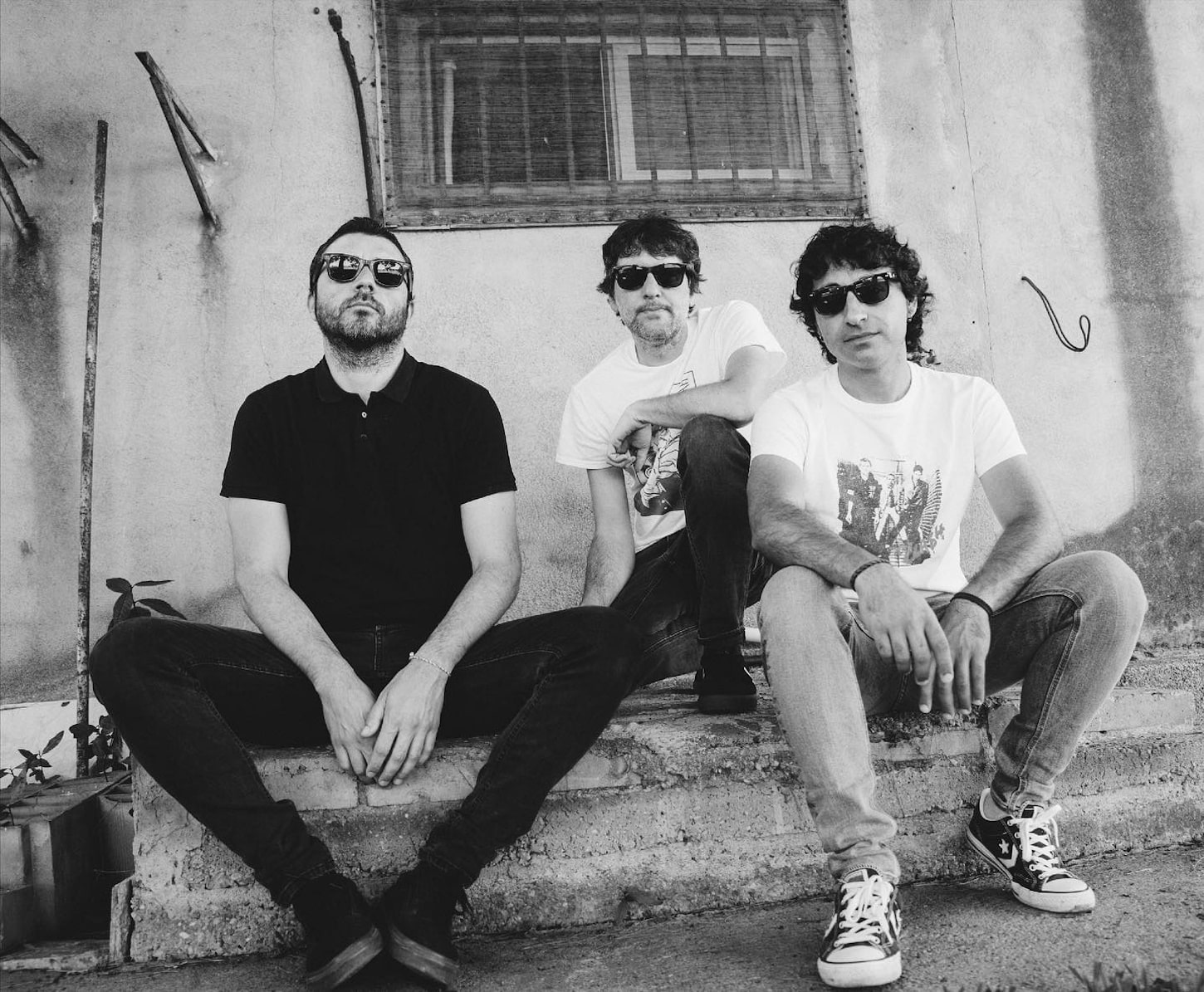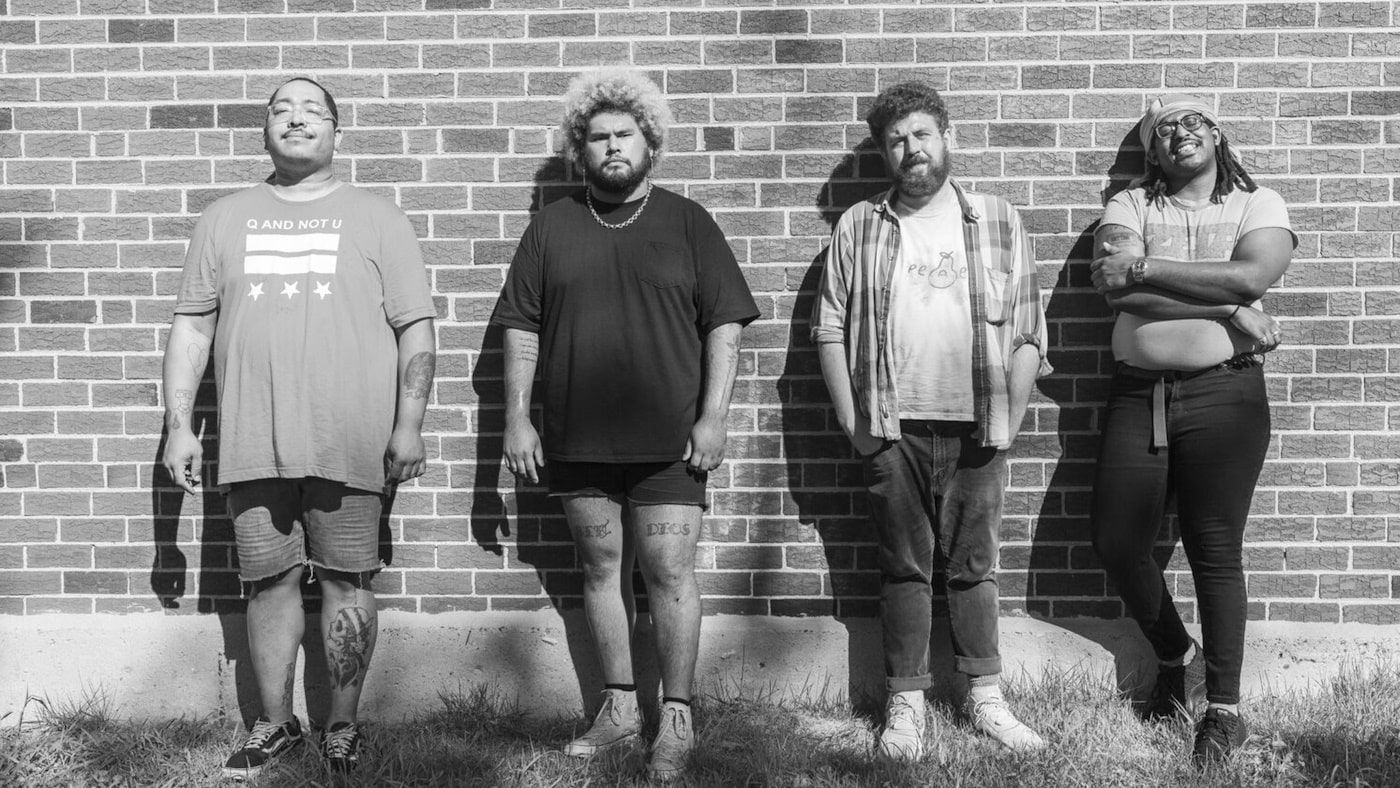In the crucible of Cork, Ireland’s vibrant musical legacy, Ian O’Callaghan has forged an eclectic path that few could anticipate, yet one that is deeply reflective of his wide-ranging artistic sensibilities. Known better by his evocative moniker Auld Blue Eyes, O’Callaghan is a maverick who’s cut his teeth on hardcore and grindcore stages, sharing sweaty, packed venues with iconic bands like Madball and Every Time I Die. But in recent years, a metamorphosis has transpired. Trading the ear-piercing screams and percussive onslaughts for a sound infused with melodic vulnerability, he’s entered a solo venture that defies easy classification. From upbeat indie rock to what he wryly describes as “middle-aged screamo despair,” Auld Blue Eyes is not merely a side gig, but a complex musical discourse on aging, identity, and the evergreen quest for sonic innovation.
His latest single “Sam” serves as a litmus test for this creative pivot, a result of a curious mix of circumstances and existential musing. Stricken by a relentless cough that rendered his signature vocals unusable, O’Callaghan resorted to a cacophony of pedals and tech-savvy improvisation to convey an emotional breadth without the scaffolding of his voice.
The song was mixed by Joe Jolley of Hope Is Noise, another band from Cork’s indie scene, and it amplifies the angsty undertones into something almost claustrophobic—an affective state that O’Callaghan describes as “absolutely delightful.” Even the accompanying music video is a surreal vignette sprung forth from a vivid dream, rendering into frames a mind-space that was previously confined to REM cycles and subconscious murmurs.
In our special interview, Ian O’Callaghan dissects not just the mechanics of his sound, but its soul. He takes us on a journey through his musical evolution, one that’s both deeply personal and intrinsically tied to the Cork music scene. He explores the dichotomy between his solo work and the collaborative ethos of band life, commenting on his recent involvement with “cowboy hardcore supergroup,” Uncultivates, and how these varied musical experiences are shaping his current worldview.
What you’ll find is not just an artist in flux, but a man reflecting on the contours of a life lived loudly. It’s an odyssey worth your attention. So settle in, crank the volume, and prepare for an exploration into the sonic world of Auld Blue Eyes.
Having played in hardcore and grindcore bands for almost two decades, how do you feel those roots manifest in your solo work as Auld Blue Eyes?
I think the noise is always there, I always loved the sound of a nice melody played on heavily distorted guitar and bass. I suppose I’m trying to write the nicest songs I can but I am who I am and it’s always going to be influenced by everything I’ve done before, so noisy.
Can you talk about the musical or lyrical inspirations that were critical in your shift towards a more melodic post-hardcore sound?
My friend Big Ron made an observation at the weekend and I think he’s right. When you’re very young you tend to write silly lyrics, about movies or embarrassing stories about your friends, for fear of exposing too much of yourself in a song and then as you get more comfortable, a few years in to playing music, the lyrics get a bit deeper or even darker in tone as you start to take the music more seriously. But, in your late thirties, things seem to swing back around again. At this point you really shouldn’t be caring what people think of you and if you want to, you can have a little fun with the lyrics again, even with darker subject matter. The same goes for the music, when I was young and playing in grindcore and hardcore bands, I thought that we had to be as heavy as possible, all the time. In hindsight we probably ruined a few songs with that approach.
What was the most valuable lesson you learned during your time supporting well-known bands like Madball and Every Time I Die?
I don’t know if there’s any specific lesson I learned from that time but my ego back then wouldn’t allow me to be worse than any other band we were playing with, so it made us practice like lunatics, three times a week, up to six hours per practice. Now don’t get me wrong, we were obviously outshone by these bands, massively, but it made us knuckle down and take things more seriously for a few months anyway. To try to close the gap between them and us.
Do you feel that your Irish background influences your music in any way, especially coming from a place like Cork, which has a rich musical history?
I’m far from anything like traditional or folk music but I do always try to use my own accent when I sing, or even scream. Something that seems to confuse people. It’s been pointed out so many times by people after gigs or online, but to me the far more pertinent question is why are Cork people singing with American or English accents?
What catalyzed the decision to venture into solo work with Auld Blue Eyes? Was it a sudden spark or a slow-burning desire to explore new musical terrain?
I loved writing music with my old band Terriers. We described it as post classic rock. Basically post rock with some screaming and a few solos. At least the first few Auld Blue Eyes songs that I wrote could have been dumbed down Terriers songs. Some were even ten year old riffs that had been rejected by the lads in the band. I had been messing with them for a few years but it was during lockdown that I decided to pull the finger out and get them recorded properly. Nothing like a global pandemic to get you motivated.
Can you elaborate on how it feels to take full control of the creative process in a solo endeavor compared to collaborative band work?
I was second guessing myself a lot and sending ideas on to a few friends, probably testing the limits of their patience to be honest but now that I’m settled in to it, I love it. I still love the feeling of collaborating with a band and seeing what it sounds like when a group of people with different ideas come together but it’s nice to know now that I’m definitely of some value. There’s physical proof that I can make a song on my own. After two decades of playing with far better musicians than myself, it was good for the auld self esteem to get these recorded on my own.
“Sam” is described as an experiment due to your physical limitations at the time. How did your throat condition affect your emotional and creative state?
It actually got me really down. My voice was gone for about five or six weeks and I was starting to wonder if it would ever come back. If I’m not the guy singing in too many hardcore bands anymore, then I’m just Ian the postman. Which I will be sooner or later but I wasn’t quite ready for that yet. Luckily it came back but they were a depressing few weeks.
You mentioned using a TC Helicon Talkbox for your vocals on “Sam.” Can you dive into your love for tinkering with music technology and how it has evolved your sound?
Running my voice through pedals isn’t something I would have started doing on my own but the guys in Horse suggested it enough times that I took the hint. They wanted to move away from a traditional hardcore style and in to something a bit more experimental so I went along with it. I’m very glad I did though, it opened me up to a lot more styles that I never would have considered or even believed that I could pull off.
What drew you to work with Joe Jolley on mixing “Sam”? How did his influence amplify the mood you were going for in the track?
Joes band Hope Is Noise have been my favourite band since I was a teenager. My girlfriend is constantly pulling me for exaggerating but I promise it’s not hyperbole when I say that there’s absoluetly no way that I end up playing music if not for catching Hope Is Noise live at just the right time. It was love at first sight.
Back in 2019 I had been jamming the songs that later became my first EP with my friend Emmet, who mixed my first two EP’s and Joe. It kind of fizzled out but when Joe offered to mix a track for me a few months ago, it seemed very fitting that he do it. I’m so glad I went with him, he managed to make it sound so noisy and claustrophobic, which sounds like an insult but no, it was exactly what I wanted
You said the song would have no place on an EP or album. Do you envision future releases that could potentially match its tone, or do you see it as a one-off experiment?
Well I recorded three songs in those few weeks when I was voiceless that aren’t exactly similar but were made with the same restrictions. So they’re all a bit sadder sounding and with heavily affected clean vocals. I think I’ll put them out eventually but maybe not next.
You translated a dream into a music video. How surreal was it to see that dream manifest in the real world through Rob O’Halloran’s filmmaking?
Bizarre! It’s mad that he pulled it off. I’d imagine he had to fight a lot of urges to make things look better, to stay true to what I wanted. He’s such a talented fucker. We’re friends a very long time at this stage. There’s literally nobody else I’d have went to with an idea this strange. The whole thing was filmed in my living room, we waited for a day that my girlfriend wasn’t around and converted the room in to a spaceship. My friend Kev sauntered in, three sheets to the wind at lunchtime and we threw a shirt on him and told him he was a NASA scientist. It was a really fun day.
What’s the significance of including the ‘urinating in a hose’ scene in the video, despite it not being part of your original dream? Was it purely for realism, or is there another layer to it?
I could say a lot of great things about Rob but him messaging me videos about space and aliens at 3AM wouldn’t be high on the list. I’m assuming he saw it in one of these and insisted that it be in the video.
How has your experience with Uncultivates compared to your past band experiences, and what unique aspects do they bring into your life as a musician?
I’m yet to play a gig with them but so far it’s been a lot of fun. With my last band Horse I wrote some very miserable lyrics and convinced myself that I needed to really think about those every time I performed,to make sure that it came across in the performance. I’m not sure if that worked or not or even if it’s worth the stress if it did work but I’m going to try to keep it a lot lighter with Uncultivates. Famous last words!
With both Auld Blue Eyes and Uncultivates in the pipeline, how are you managing your creative time between the two projects?
I actually have a third project on the go now too, LOW VIOLENT. A three piece hardcore band. I wouldn’t say I’m managing my time well whatsoever but I’m up the walls busy with music for the first time in a long time and I’ve had a lot worse complaints than that.
Can fans expect any future collaborations with other artists or musicians who’ve influenced your work? Are there any dream collaborations you’d love to make happen?
To be honest Dan from Hope Is Noise was a dream collab and I talked him in to it very easily. I need to follow up with a few friends who told me that they’d lend me their voices for a track. Emmet, Leah and Jonny Piss, I’m coming for ye, there’s nowhere to hide.
In the spectrum of your musical journey, what has been your most transformative or defining moment so far?
Supporting Every Time I Die back in 2012 with Fat Actress will be hard to top. It felt like a bit of recognition for the amount of hard work we had been putting in for years. But sometimes it can just be a random show where the crowd are insane and you almost black out you’re so in to the gig. In fact I did black out In Sheffield during a gig like that. Not even a very big room but just a perfect gig.
What message or feeling do you hope your audience takes away from your music, whether it’s from “Sam,” “Have Angst, Will Travel,” or future releases?
I’m not sure really, I know I have a habit of writing when I’m in a bad mood. It never crosses my mind to write something when I’m in a good mood, but then I realise that the lyrics are too miserable for the music so I try to bring the song back around towards something more hopeful by the end. So, Hope? Christ, that’s fucking cheesy. I suppose it’s true though
Finally, what’s next on the horizon for Auld Blue Eyes? Can we look forward to any tours, new singles, or special projects?
Auld Blue Eyes will have to take a back seat for a little while until I get up to speed with the new bands and play some shows but I should be back to releasing stuff again by December or January.
Want to keep our quest rolling?
This magazine is a one-man DIY operation, tirelessly spotlighting the local cultural scenes and independent bands that often go unreported elsewhere. Born in the early 00s, this platform has been committed to giving hard-working artists the high-quality coverage they truly deserve.
No ads, no distractions—just pure inspiration and a genuine focus on independent artists and their stories.
Please consider helping keep IDIOTEQ ad-free and in tune with the indie scene by donating today.
DONATE via PayPal 𝗈𝗋 SUPPORT via Patreon
100% of the funds collected go toward maintaining and improving this magazine. Every contribution, however big or small, is super valuable.
Your support ensures that we continue to be a place where you can discover, learn, and get inspired, without any advertising noise. Thank you for being a part of this musical journey.











